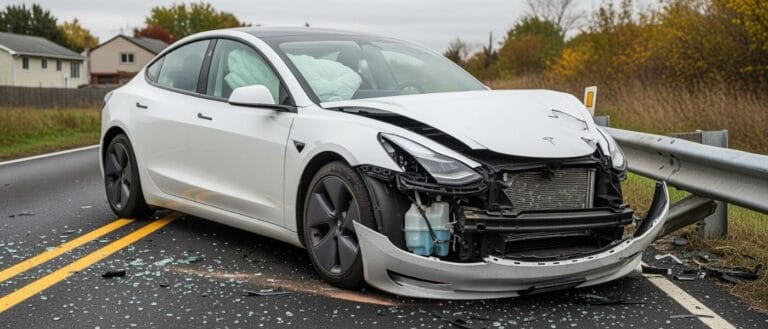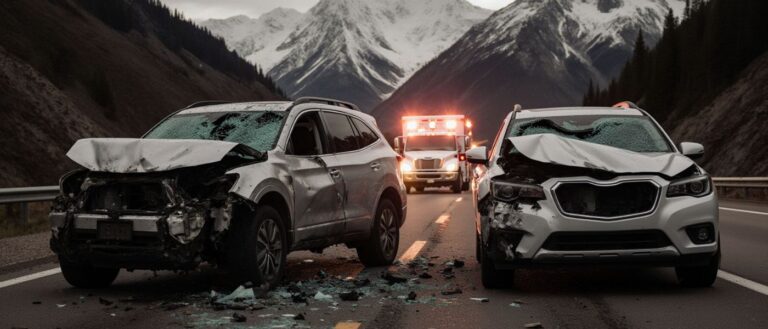How do I obtain a car accident police report in Colorado?
A common question our clients ask us is How do I obtain a car accident police report in Colorado? It’s not too complicated, but there are a few steps to keep in mind. After a crash, this report can be pretty important for insurance claims and, sometimes, legal issues down the line.
To get your crash report, you’ll need to fill out form DR2489 (Requestor Release and Affidavit of Intended Use), pay a fee, and wait—sometimes up to 90 days for processing. The Colorado Department of Revenue keeps these on file for seven years. If you get stuck, their number is 303-205-5600.
If your accident involved the Colorado State Patrol, be ready to provide specific crash details. In Denver, the Records Unit usually handles these reports (they run about six pages and are what insurance companies want). If you filed your report online, though, you’ll need to grab it from the Colorado Crash Reporting Website.
Understanding Car Accident Police Reports in Colorado
Police reports are the official record of a traffic accident in Colorado. They lay out what happened and who’s involved, which is why insurance companies and lawyers want to see them.
What Is a Police Accident Report?
A police accident report is what officers fill out after they respond to a crash. In Colorado, these reports include things like:
- Date, time, and location of the accident
- Names and contact info for all drivers
- Vehicle details—make, model, license plate
- Descriptions of vehicle damage
- Witness statements and contact info
- Weather and road conditions at the time
- The officer’s take on what happened
- Any tickets or citations issued
Sometimes you’ll see a diagram of the crash scene, too. This report acts as an objective account—at least in theory—of the incident.
Why Accident Reports Are Important for Record Purposes
Car accident reports are the official version of events—something both insurance companies and, occasionally, courts rely on. It’s a way to pin down the facts before memories start to fade or change.
For insurance, this report is basically a neutral third-party account. Without it, claims can get messy or even stalled. Plus, all these reports help the state spot accident-prone intersections or roads that might need fixing.
Who Files Crash Reports in Colorado?
Depending on the situation, it might be law enforcement or the drivers themselves who have to file an accident report in Colorado.
Police officers step in and file reports for crashes they respond to that involve:
- Injuries or fatalities
- Hit-and-run cases
- Suspected DUI/DWAI
- Property damage over certain limits
If police don’t show up, drivers themselves have to report the crash to the Colorado Department of Revenue—especially if someone got hurt, killed, or if property damage is over $1,000.
- Injury or death
- Property damage exceeding $1,000
You typically have 10 days to file if you’re doing it yourself. The Colorado State Patrol sends their reports straight to the Department of Revenue for the official record.
How To Obtain a Car Accident Police Report in Colorado
Getting your hands on a car accident report in Colorado depends on which agency handled your crash. There are a few ways to do it—online, by mail, or straight from the law enforcement folks involved.
Requesting an Accident Report Online
The Colorado Department of Revenue lets you request accident reports online. Head to their site and look for the “Crash Reports” section. You’ll fill out form DR2489 and pay a fee.
They keep records for seven years, so if your accident was recent, you should be covered.
If there wasn’t an officer at your accident, you can file your own report online at Colorado.gov. Just know that these self-reports aren’t investigated—they’re mainly for the record.
Obtaining a Report from a Law Enforcement Agency
You can also ask the agency that investigated your crash for the report. For State Patrol cases, you’ll need:
- Name of the driver
- Date of the accident
- Location of the accident
- Case number, if you’ve got it
But here’s the thing: the State Patrol doesn’t actually give out copies themselves—they may send you to the Department of Revenue (yep, that same 303-205-5600 number).
Local police departments have their own rules, so it’s best to call the one that showed up to your accident and see what they need.
How to Request an Accident Report by Mail
If you prefer mail, here’s what to do:
- Fill out form DR2489
- Include your payment (check or money order)
- Mail everything to the Colorado Department of Revenue
You’ll need to include:
- Full name of driver(s)
- Date of the accident
- Location of the accident
- Your relationship to the accident (like if you’re a driver, attorney, etc.)
Double-check the address on the form, and be patient—processing times can vary.
What to Expect When Requesting Your Report
Once you send in your request, it could take up to 90 days to get your report back. That’s partly because the agency has to finish their side of things before it even gets entered into the system.
Fees vary, so be ready to pay when you submit your request.
If your crash just happened, the report might not be ready yet. Officers need time to finish their investigation and file the paperwork.
When you do get it, expect to see details like driver info, vehicles, a rundown of the accident, and maybe the officer’s notes. It’s the official document you’ll need for insurance or legal matters.
Essential Information Needed for Your Accident Report Request
You’ll want to have certain details handy when you ask for a Colorado accident report. It speeds things up and helps avoid any back-and-forth or delays.
Details to Provide When Requesting a Police Report
Here’s what you’ll need:
- Date of the accident – The exact day it happened
- Location – Street names, intersections, or mile markers
- Your full name – Like it is on your license
- Names of others involved – If you know them
- Case/report number – If you have it (from the State Patrol Incident Report form)
- Your vehicle info – Make, model, plate number
If State Patrol had your car towed, you probably got an Incident Report form. Hang onto that—it makes tracking your case much easier.
Understanding Report Fees and Processing Times
Reports usually cost between $5 and $10, depending on where you request them. The Department of Revenue and most local police departments take checks, money orders, or credit cards.
Processing times aren’t set in stone, but here’s a rough idea:
- State Patrol: 7-10 business days
- Local police: 3-7 business days
- Online requests: Sometimes just 1-3 business days
Reports tied to ongoing investigations can take longer. Some places offer faster service for an extra fee, but that’s not always guaranteed.
And if there’s been a big storm or lots of accidents, expect things to move a bit slower.
Role of the Colorado Department of Revenue and Motor Vehicles
The Colorado Department of Revenue (and the Division of Motor Vehicles) are the folks managing accident reports and driver records. They’re the ones to call when you need official documents for insurance or legal stuff.
Accident Reporting Requirements for Drivers
Colorado law says you have to report accidents to authorities. If police didn’t show up, you can file online with the Department of Revenue’s Motor Vehicle Division.
These self-reports aren’t investigated but do become part of your driving record.
Online reporting covers you if:
- Someone was hurt
- Property damage is over the state’s threshold
- It’s a hit-and-run
The Department keeps these reports and can release them to insurance companies or attorneys if needed.
Departmental Responsibilities and Procedures
The Department of Revenue oversees driver records and accident reports through its DMV division. To get your accident report, reach out to them directly at 303-205-5600.
For State Patrol reports, you’ll need to provide:
- Driver’s name
- Date of accident
- Crash location
They also help with:
- Duplicate license requests if you lost yours in the accident
- Updating your address so documents get to you
- Keeping records for insurance or legal uses
Requests by mail go to the DMV in Denver. Just make sure you include the right form and payment—checks or money orders made out to the Colorado Department of Revenue.
Using Accident Reports for Insurance Claims and Compensation
Police reports are key evidence if you’re trying to get compensated after a car accident. They lay out what happened and can make a big difference in how your insurance claim shakes out.
Submitting a Police Report to Insurance Companies
Most insurance policies want you to report accidents quickly. When you file a claim, send them a copy of the police report ASAP. In Colorado, you can do this:
- Online through your insurer’s website
- By email to your claims adjuster
- In person at a local office
- Or through your insurance agent
Insurance companies use the report to check claim details and figure out who’s at fault. Always include the incident number when you talk to your insurer—it helps them keep track of your claim.
How Accident Reports Support Compensation Claims
Police reports are packed with info that can help your case. They include:
- The officer’s observations—road conditions, vehicle damage, etc.
- Statements from drivers, passengers, and witnesses
- Any citations or laws broken
- Crash scene diagrams
Insurance adjusters put a lot of stock in these reports when deciding who was at fault. Even if courts don’t always use them as direct evidence, they’re still a big deal in settlement talks.
What Insurance Companies Need from Your Report
When insurance companies review your report, they’re looking for certain details. Here’s what stands out:
| Critical Information | Why It Matters |
| Date, time, location | Shows your policy was active |
| Weather conditions | Helps explain what happened |
| Vehicle information | Matches your policy to the accident |
| Witness statements | Offers a third-party view |
| Diagram of accident | Clarifies positions and impact |
They’ll be checking to see if your story lines up with the report. If not, that could slow things down or even get your claim denied.
If parts of the report help your case, point those out. And if you spot mistakes, reach out to the police department that issued it—they might be able to fix errors if you ask.
Legal Considerations After a Car Accident in Colorado
Colorado has its own set of rules for what happens after a car accident. Knowing what the law expects can make a real difference, especially if you’re worried about protecting your rights or just not missing something important.
How Accident Reports Affect Personal Injury Claims
Accident reports are a big deal in personal injury claims. These official records lay out what happened, who’s involved, and the officer’s first take on who’s at fault.
Insurance companies lean on these reports when figuring out liability. If the police report’s in your favor, it can really help your case for getting compensated.
Lawyers use these reports as a sort of anchor when building cases. Details from officers tend to carry more weight than just what people say afterward.
If you spot something off in the report, you can ask the agency to fix it—don’t wait around, since mistakes can mess with your claim.
The report also nails down the timeline, which matters since Colorado gives you three years to file a lawsuit or resolve a car accident injury claim.
Steps to Take When Facing Injuries or Property Damage
If there are injuries or damage, report the accident right away. Colorado law says you have to report any accident involving injury, death, or property damage.
Even if you feel okay, get checked out by a doctor. Injuries can sneak up on you, and having medical records ties your injuries to the crash.
Take pictures, collect witness info, and keep every scrap of paperwork—medical bills, repair estimates, whatever. It all helps if things get complicated later.
If things are serious, you should definitely talk to a car accident attorney. Lots of them will chat for free just to see if you have a case.
File your insurance claims as soon as you can. Colorado uses a modified comparative negligence system, so if you’re partly at fault, your payout can get cut down by your percentage of blame.
Hang onto receipts and records for anything related to the accident—doctor visits, missed work, car repairs. You’ll need them to show the full impact if you end up in a lawsuit.
Common Issues and Solutions When Obtaining Colorado Crash Reports
Even when you think you’ve followed all the steps, getting your Colorado accident report isn’t always smooth sailing. Sometimes stuff goes missing, or the report doesn’t match what really happened.
Missing or Incorrect Accident Reports
Crash reports aren’t always ready when you expect. The Colorado Department of Revenue says it can take up to 90 days for a report to show up in the system. If it’s still missing after that, reach out to the law enforcement agency that handled your accident.
Sometimes reports have mistakes like:
- Wrong vehicle details
- Incorrect location
- Misidentified people
- Events described inaccurately
If you notice errors, gather anything that supports your side—photos, witness info, repair bills.
To get things fixed, send a written request to the agency that wrote the report. Make sure you include your case number and point out exactly what needs changing.
How to Resolve Disputes or Concerns
If you disagree with information in your Colorado car accident report, you’ve got a few options. Start by reaching out to the officer who wrote the report and let them know what you think is off—be as specific as you can.
If that doesn’t get you anywhere, you might try the following:
- File a supplemental statement to add your side to the official record
- Ask the police department for a supervisory review
- Share extra evidence, like dashcam footage or statements from witnesses
For bigger disputes—especially ones that could mess with your insurance claim—you should not hesitate to talk to a car accident attorney. They can help you push back against any wrong info that could hurt your case.
And just so you know, Colorado keeps crash records for seven years, so you don’t have to rush if you need to fix something in your report.







